The Worldview of Biocentrism–You Are One With The Force
For several years now I’ve heard of Dr. Robert Lanza’s “Biocentrism” but didn’t quite get what it was about from snippets I’d heard. I decided to purchase a copy of his book, Beyond Biocentrism, and see what he had to say for himself, since I’m always curious about new ways of conceiving of the universe. What I found in his worldview directly relates to concepts in certain stories, most famously the Star Wars franchise. Biocentrism has much in common with Hinduism and imagines the entire universe is connected as a single being, pretty much like “the Force” of Star Wars, but more developed.
Even though I felt there were truck-sized holes in Dr. Lanza’s logic (he’s an MD by the way), I think he’s offering some genuine competition to Intelligent Design as a means to explain the universe. Which concerns me, so is worth talking about. But his ideas also have implications concerning the worldview behind stories.
A Brief De-Confliction vis-a-vis Ethical Biocentrism
In ethics, “Biocentrism” means believing the needs of human beings are not greater than any other form of life. That’s in contrast to the view that human needs matter most–which we can fairly said has been a belief held by every literate civilization on Earth to one degree or other. But in particular Western civilization has maintained that human life matters more than animal life–and this view of course finds support in the Biblical account of the creation of Adam and Eve as the final piece of God’s creative work on Planet Earth.
“Ethical Biocentrism” is a broader idea than animal rights activism, so that not all ethical biocentrists are animal rights activists, but all animal rights activists are biocentrists. Biocentrism has a weird self-contradiction running down its center in my estimation–every other species reproduces as much as it naturally can and eats what it can eat and takes what environmental space it can take, limited basically by their ability to travel and adapt to other environments. So in effect, Ethical Biocentrism calls on human beings and human beings alone to restrict their domination of other life. Because we are not any more important than any other life, we need to restrict ourselves–us humans beings the only species to do so, as if we really were the most important.
I think God setting up humans as the managers of nature, the gardener of Eden, is more straightforward. We are more important than other life, but have an obligation from God not to wantonly destroy species God created with a purpose.
But anyway, Ethical Biocentrism is not Robert Lanza’s Biocentrism, which is a quasi-scientific take on the nature of the universe. (Though I can easily imagine a Lanza-style biocentrist being an ethical biocentrist…)
Biocentrism in a Nutshell
The Brain
Beyond Biocentrism didn’t begin talking about the brain (it started with phenomena science doesn’t understand well, especially the beginning of the universe and the concept of time) but I think its concept of the brain is key to what it offers as a worldview that hasn’t been said before. In essence it states what you experience every day isn’t the real world, it is a reality generated entirely in your brain. You take information into your brain through your senses, not so much learning about the world but the world you perceive is actually the same as your brain activity. Lanza literally said if you see a tree, you are seeing it in your brain. When you reach out a hand to touch a tree, your hand isn’t outside you, either. It also is a projection of the brain. When your hand runs across a tree, the sensation is in your brain, not outside it.
This view meshes pretty well with the postmodern view that observers or speakers are 100% part of any statement they make. It is not even possible to be objective if your very being is created by your mind function–which is not something Lanza said, but an idea that follows from what he said. Though Lanza also threw out appeals to objective truth when it suited his line of reasoning, Biocentrism as a philosophy doesn’t embrace the idea of an independent universe outside of an observer.
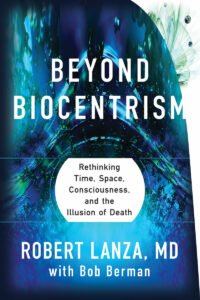
Here’s the cover of the book I read. Copyright: Dr. Robert Lanza.
Consciousness
The book I read was overly simplistic in its style for my taste, by the way, but it did point out some truths about what scientists actually believe. One is that the problem of consciousness, while ignored by some people as unimportant, is a major question that science has a hard time dealing with. Why is anyone conscious? Why do we perceive we have choices and experiences of life if we are nothing more than biological machines?
Some atheists like Sam Harris basically say consciousness is nothing special and the sense that we have choices is an illusion. We are just machines, people like Harris say, and so when we assemble in one place enough electronic circuits (in building computers), we should expect consciousness to develop in them–computers will eventually become conscious because that’s all our consciousness is, the assemblage of sufficient processing power. Note this basic idea has undergirded a lot of science fiction, from Hal 9000 in 2001 A Space Odyssey to Star Trek‘s Data, to many, many other fictional AIs.
Christian thinkers in general would say that processing power isn’t enough to explain being conscious and there’s something special about the ability to perceive the world as we do. Something beyond the physical, we would say in most cases–a soul or a spirit, which either directly or indirectly came from God.
Lanza’s view is neither Christian nor atheist. He says that the entire universe is actually a single conscious being–which is yes, Pantheism, though I didn’t notice him using that word. Consciousness isn’t a puzzle to solve about the universe, he would say, it is a feature of the universe. In which all is alive. Our own consciousness is merely a reflection of the whole–but we are able to “get it” (Lanza’s words) and realize we are just a piece of the whole. So consciousness is eternal and doesn’t require explanation as a thing that arises from processing power. All things, processing power or not, are part of a conscious whole.
Lanza openly admits this idea parallels Hinduism and other Eastern religions, but doesn’t embrace reincarnation or other specifically Hindu ideas. But he does, no kidding, think the universe is one entity, one source of life, one consciousness, of which we all are part.
Let’s call his concept “the Force”–even though he doesn’t say it gives Jedi their power…
Time
Time, there is no time in the Force. Time is a construct of our brains, competitively evolved to survive, not understand our universe. Yes, Lanza embraces evolution when it suits him, but casts it off when it doesn’t, as I will bring up a bit later.
By the way, I’ve read a number of books by physicists for lay people in which the subject of time has come up. Time is a real puzzler for a lot of scientists because most equations are time-neutral. Only a few things in nature really seem to require time. One of those is thermodynamics, which Lanza dismissed in a way I did not find satisfying. But I’m pointing out that Lanza may sound crazy to some Speculative Faith readers, but in fact isn’t too far off from how a number of top scientists think about time. A lot of physicists find our experience of time to be odd and hard to explain.
Eternity
There is no beginning of the universe in Lanza’s view. The universe has always existed and always will exist. Time is an illusion produced by human brains and the limits baked into them by evolution–wait, I thought the brain was all part of one consciousness which wouldn’t have to have any supposed evolutionary restrictions (SHSH! Travis, you’re thinking again). But anyway, since Lanza thinks time isn’t really a thing, then death isn’t really real, either. We live in an eternal now, without beginning or end, perceived as a beginning or end only by the limitations of our brains.
This may sound wacky to most people reading this post and I’m not saying it isn’t–but logically the strongest competitor to the idea that God created the universe isn’t a randomly-self generating universe (an idea I poked holes in a previous Speculative Faith series), but the idea that the universe has always been around and thus doesn’t require an explanation for its existence. Aristotle believed in an eternal universe, which Lanza quotes (though Aristotle also believed in a “first mover” which many Christian theologians equated with God, which Lanza didn’t mention). Einstein also believed time was an illusion in that all moments of time should have a real existence at any moment (because of space-time and time being a dimension like space)–so why do we experience going from moment to moment? Einstein couldn’t explain that. Lanza tries to by saying, “Brain function.”
Paralleling Intelligent Design Thinking
Lanza doesn’t hesitate to pull out intelligent design arguments against the universe self-generating randomly and offers a cool thought exercise of a million imaginary monkeys randomly typing on a modern 58 key computer keyboard, assuming they typed 45 words a minute without rest of any kind, would take 36 trillion years (2,600 times the age of the universe) for it to be probable that one of them would type the exact words, “Call me Ishmael.” Let alone the exact combination of events leading to the Big Bang–or generation of life.
However, his answer isn’t that there is a single Being outside of time and space that conceived of the universe and created it (the Christian view) but rather that the universe has innate intelligence, and while evolution happened, it was guided by this unseen hand of the universe itself. All is one–the Force made us–and itself.
Of course, for evolution to happen, time has to happen, but I think Lanza would say no, that all stages of evolution are in essence simultaneous like all moments are simultaneous. This is clearly stuff that doesn’t line up with a Biblical worldview (a self-evolving but timeless universe), but I’m just reporting what I’ve read here and conclusions I’ve drawn from it
I found it mildly disturbing that logical reasoning launched versus a random self-generating universe can so easily be bent into arguments for a conscious self-generating universe. Though there’s ways to respond to Lanza’s point of view.
Ducking Cause and Effect
Lanza takes on the riddle of time and consciousness with unusual solutions, which are topics many physicists acknowledge are real puzzlers but then they more or less duck the question. So maybe we can think of Lanza as courageous for making controversial stances on these subjects.
However, when it comes to cause and effect, Lanza ducks what I see as a massive problem with his worldview. That is, he takes potshots at standard ways of looking at the universe as insufficient to explain it, including lobbing a few remarks versus the Christian worldview that holds on to a traditional interpretation of the Bible (for example, mocking the idea of Noah’s Ark based on 8 million known modern species). Though mostly he tears into the materialist worldview that ignores certain problems I’ve already mentioned.
But, all reasoning is tied to cause and effect–you are asserting something was caused by something else when reasoning why it happened and asking what possible option best explains what caused it. How can that process be reconciled with the idea of a timeless universe? Cause and effect either is time, or it is an inevitable component of time. We know time has passed because something has happened. What happened was caused by something else over a period of time–how can anyone reason about anything, ever, without recognizing time is required to even discuss concepts of cause and effect? Or to discuss proof and evidence, for that matter?
I imagine Lanza would say something about an illusion of cause and effect to my criticism and maybe say something about only using logical proof to point out its own fallacies, as the ancient Greek philosopher Zeno did (Lanza quotes Zeno). In contrast, I would say any kind of reasoning that nullifies reason itself, rather than teaching us to abandon reason, can be fairly criticized as inherently faulty. But that’s because I believe in an orderly God who created an orderly universe–who is capable of blowing our minds with the facts of how things work. But who does not cancel out reasoning itself–on the contrary, God is pro-rationality (which isn’t the same as being pro-what the majority of humans think).
Anti-science?
Lanza does sing the praises of intuition, though he also appeals to reason. He downplays conventional scientific approaches but tries to overcome what he sees as their deficiencies (such as believing time is real) with heavy reliance on neuroscience, drawing from his experiences as a physician no doubt.
So overall this philosophy is pro-science and anti-scientific realism–“scientific realism” being the idea there is an independent universe outside of the observer of the universe. So Lanza is in effect trying to “square the circle” of getting people to accept the benefits of modern science by saying it has observed real things (especially about the brain), while also embracing subjectivity in a way wholly compatible with postmodernist thought.
The Force
Lanza doesn’t go into the idea that the universe could supply a person with power like a Jedi has or the unity of the universe could provide a rational explanation for what would be de facto magic, other than saying intuition has a genuine basis via connecting with the universe in a mysterious way. I’m not sure he would buy that Jedi power greater than intuition would be possible.
However, if I didn’t know the timeline of ideas, I might think that Lanza’s Biocentrism inspired George Lucas to write Star Wars. But Lanza came out with his theory in 2007 and Star Wars came out in 1977. So maybe the inspiration flowed the other way around. Or maybe both were inspired by Hinduism. (Hey, am I talking about the pesky subject of time again? 😉 )
Certainly ideas of what the Force is or how it works could be clarified by Lanza’s notions. Note also that just as Hinduism could say all-is-one yet embrace specific gods like Krishna, Lanza’s Biocentrism I think would be essentially compatible with modern Paganism.
These ideas could inform the types of stories Christians read and write. We don’t want to reproduce what Lanza is thinking, to be sure. But we should be aware that such ideas exist. Perhaps we can either write or focus our reading on stories that reveal the downsides of such a philosophy…
Conclusion
Overall, while I felt that Biocentrism suffers from some massive logical contradictions, the philosophy itself downplays the value of focusing on such contradictions. As such it is able to blend elements of scientific materialism with Hinduism, throwing a whopping dose of neuroscience justification in there in a way compatible with postmodernism, with room for modern Paganism to boot. And would also fit in with ethical biocentrism quite well, though Lanza didn’t talk about that.
I see this philosophy as if someone crossed Ebola with COVID 19 with small pox. Ugh. (Though, good thing is it doesn’t seem to be very contagious.)
Have any of you read Dr. Robert Lanza? Do you have any thoughts on Biocentrism, either his brand or the “ethical” kind? What are your thoughts on the Force and how Lucas’s vision does or does not contradict a Christian worldview? Am I off base in comparing the Force to Lanza’s views? Any other thoughts?














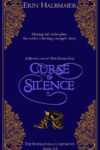







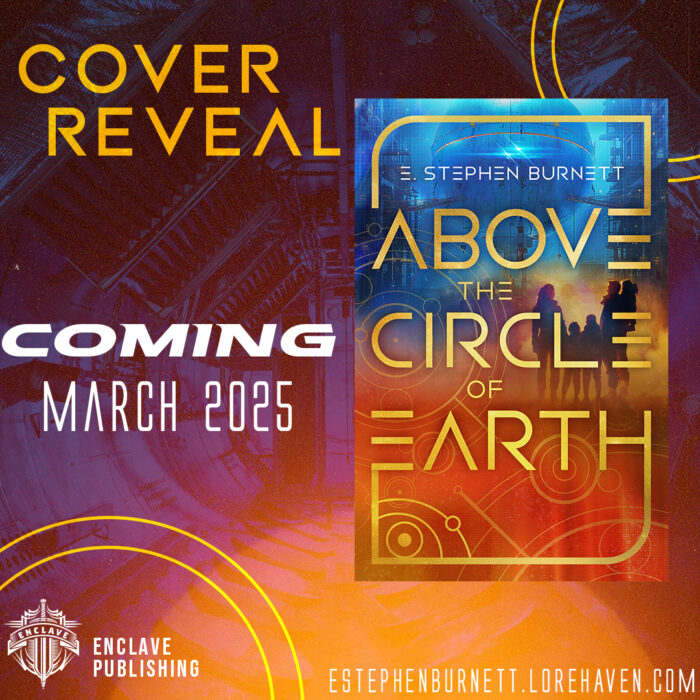








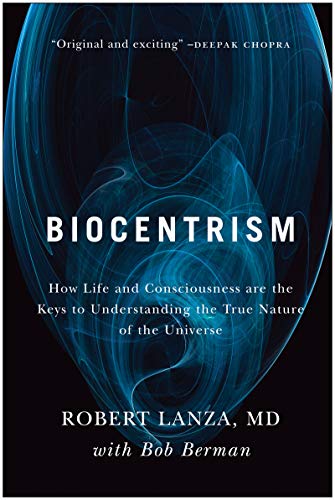




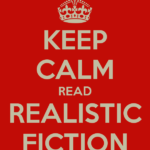



Welp, color is just a fun trick your brain plays on you (magenta is not real: https://www.pinterest.com/pin/224757837640301674/?fbclid=IwAR2EozdOWfir2rdnlTiyEaOIE4CuuY5uktgjk5bZ4JxEEwy5U1KMyIUOgB8) so I can at least see the outlines of the concept that time is also a fun trick your brain plays on you, but that’s it. IDK how that notion is supposed to interact with the rest of the world.
But it does follow the basis of postmodernist thought: that we are all unreliable narrators pinging around this sandbox of a universe.
According to Lanza, time is an illusion, space is another kind of illusion, and separation as a distinct individual (as opposed to part of the whole universe) is yet another illusion. He mentioned 3-D vision specifically as an illusion, but I’m sure he’d agree color is an illusion, too.
The thingy with the foundation of science as a discipline was not the idea that humans are reliable narrators (the founders of modern science did not believe we are), but that with vigorous methodology we can overcome a lot of our bias and discover truth if we work at it hard enough. Actually, the old-time Protestants studying the Bible believed the same thing–if we study this thing, we can understand what it used to mean before the Catholics got a hold of it. (This perspective was shaped by the Renaissance realization that culture had changed since ancient times, something medieval people were not entirely aware of and which happened largely without a plan–though the Protestants held a distinct grudge against Catholics for changing things on purpose–which for the most part they hadn’t done.)
This “if we study, we can understand” mentality is not, again, not saying people don’t tend to be unreliable. But postmodernism makes us all totally unreliable, or unreliable to the degree that it the question of objective truth doesn’t even matter anymore. Lanza’s view certainly is compatible with objective truth being unobtainable–even as he claims his theory answers riddles that people seeking objective truth have run into. Which you know, kinda annoys me.
I am a believer in scientific realism. Also in a supernatural realm, one outside our experience, but also objectively real. Understanding reality may be bloody hard, but it isn’t impossible in my worldview. Because God is very subtle, but isn’t deliberately trying to mess with our minds…at least, I’m pretty sure He isn’t…
So, I study. I don’t always know what is true, but I think truth is an obtainable goal. Truth is either the Holy Grail which I’ve had some glimpses at, or it is the windmill I tilt at, depending on how one narrates the story of my life.
Would you classify yourself as a Postmodernist?
I don’t think I’m a card-carrying postmodernist (I’d want to read all the fine print), but I definitely undress it with my eyes a lot lol
And UGH I just noticed the Deepak Chopra blurb, which undermines any confidence I could have in this book. That may not be the author’s fault, but now I’m wondering how this topic would be handled by people who aren’t lumped in with Deepak Chopra (ugh).
I don’t wanna commit to saying that it’s impossible to know things for real (whatever that means), but I think humans are riddled with enough biases and limitations of our meat-computers that it’s difficult to know for sure whether we know a thing for real or just enough for practical consistency. But practical consistency is a functional goal and that is pretty okay (maybe that is still very postmodern of me, IDK).
Would it help to think of it as the secular version of Total Depravity? Except it’s not about morality but about whether and how humans are capable of knowing things, with our handicap of our emotionally driven brains. Even when we do science to a thing, it’s possible to still criticize the parameters the scientists gave when they designed the experiment/study or their definitions when they analyzed the results.
Take CS Lewis’s quip about the food peep show that somebody referenced a couple posts ago. It makes my spidey-senses tingle and I was picking it apart at work while doing otherwise mindless tasks. And I just deleted the start of a long ramble about my pickings-apart since that’s way off topic and I totally deserve a gold star and praise for my restraint.
I’ve kinda heard of viewpoints like this before, but didn’t know they were called Biocentrism. I don’t really agree with them, but they seem fun to unpack for the sake of philosophical discussion or at least story fodder.
To an extent things ARE subjective and in our heads, but not in the way Dr. Lanza describes. I’d say it’s more like truth and reality are real and exist in a certain way regardless of what we believe, but subjectivity does lie in our PERCEPTIONS — the way we sense, interpret and react to the world around us. Using the tree as an example, the tree is a real, tangible thing that would exist regardless of what we believe. But that won’t matter much to us unless we can ‘see it in our minds’, so to speak… Meaning at least one of our senses perceives the tree and our brain decodes those sensory signals in a way that tells us it’s there and how to interact with it.
Reality is also very complicated, and people all think and perceive a little differently. A lot of times they’re technically seeing the same thing but end up arguing anyway because their minds emphasize different aspects of the thing. One person could argue that the tree is hideous, and the other person could argue that it’s beautiful. They could argue for a long time, yet it may never come out that Person 1 thinks the tree is ugly because he’s looking at the shape of it and hates it. While Person 2 doesn’t care about the shape and only thought it was beautiful because of the tree’s color.
Honestly, as much as I like philosophical stuff and exploring ideas, sometimes I see theories like the one Dr. Lanza describes and wonder why people act like it matters in terms of real life application. Some of what he says reminds me of those ‘we all live in a simulation’ theories. If we did live in a simulation it would be cool to know, but unless we’re in a horrible situation like The Matrix, we probably don’t NEED to know. It’d be very hard to prove, at any rate, and it wouldn’t matter if everything in the simulation was ‘fake’ because we don’t have much choice but to interact with it as if it truly was real. If we thought nothing was real we might be less inclined to treat each other or even ourselves very well.
That said, I know I shouldn’t be casually brushing off ideas just because they don’t seem to have any direct real life use. I guess as I get older I just have less patience for certain things. At the very least thinking through this stuff can really help not just with storyworld building but also characterization. Mainly in the sense of learning to go beyond arguing about the ideas and actually learning to understand the people behind them. We can think a subject is crazy, but to realistically portray characters that capture the essence of why someone might adhere to Dr. Lanza’s theory? That takes a lot more skill and understanding and actually does have lots of real life benefits.
As for Ethical Biocentrism, I’ve seen a decent amount of that because, for most of the time I’ve been on the internet, I’ve hung out in/observed several online communities revolving around anthropomorphic animal stories. Some people believe in Ethical Biocentrism because they’re super empathetic and want all life to be treated well regardless of what species it is. Other people use it in a way that shows clear hatred for humans, or at least resentment and a desire to look down on them.
I sorta disagree with your statement that ‘all animal rights activists are biocentrists’, though. A person can hold human needs in the highest priority, but still be activists for animal rights because they don’t see any reason to mistreat a creature that is capable of feeling pain. Though of course there’s different types and levels of activism.
Thanks for your comment.
As for the practical weight of Lanza’s beliefs, the reason why I compared it to a combination of deadly viruses was because of my perception of this philosophy’s ability to isolate a person from saving faith in Jesus.
Because at the wonder we feel at the universe because it is made by God, Lanza could say–“That wonder is real but is misplaced–actually the universe itself is the wonder, the great mind.” Then the holes we could poke in an atheist’s arguments for a random universe as not making sense, he can say, “Yes, the atheist doesn’t make sense, but you you don’t, either. There is no beginning.” If you talk about Christ’s work on the Cross, he could say, “Your dualistic idea of God is wrong–God does not judge nature, God IS nature and all of us, too. God judges nothing.” But if you talk about death and life after death and heaven and hell, he could say, “There is no such thing as death. We don’t die–that’s an illusion.” If a Neo-Pagan said, “I worship an ancient god,” he could say, “That’s a particular manifestation of a segment of the single divine mind–you are not quite right, but you’re close.” But he would absolutely shut down the idea of God being outside space and time. If an atheist mocks a Christian or anyone else for doubting evolution, Lanza can say to the atheist, “Oh, I’m quite with you–evolution happened.” But if challenged on how evolution happened when it’s so improbable in some aspects, he can say, “Because the universe wanted it to happen, but you are quite right about the science.” If you launch into how the worldview he holds doesn’t make sense because it logically self-contradicts at various points, he could say, “We didn’t evolve brains capable of understanding everything, just brains capable of surviving. Our logic is not able to understand everything, so if something seems a logical contradiction, it’s because human logic is inherently limited.”
So at every turn, the philosophy gives a person a warm fuzzy feeling about life but also shields a person from listening to any disagreement, preventing a person from learning, shielding a person from coming to Christ. Which I find to be sinister.
While it relates to stories, the most important reason to mention what I did to Christian people is so they will be aware of this philosophy as a potential danger to, say, their children. So I think this is a very practical topic. Even though I didn’t frame the discussion in those terms.
As for your comment on animal rights activism, I suppose you are right. I overstated my case.
I was moreso questioning Lanza’s (probable) adamance in advocating his theory, because even if we lived in a mindverse thing like he claimed, it probably wouldn’t truly change much for us, or at least not for the better. I already understood your reasons for seeing his theory as harmful 🙂
That said, I dunno. Even if I question the importance of Lanza like people pushing their theories, I can still come up with reasons why their arguments COULD be important. Like, if we were stuck in something horrible like The Matrix, shouldn’t we try to escape? Or the fact that if we understood the very fabric of reality, we could bend it to our will and escape extinction. Or going on and on about the theory could simply help people expand their problem solving skills and help them come up with other theories that actually DO have merit…
But I do agree that his theory, taken as a whole with no filters, can definitely be harmful to some people.
Interesting that you were looking at things from his perspective. Yeah, if he’s right, do we really need to know what he’s trying to show us? No, actually.
But I imagine he thinks we will enjoy life more and be more fulfilled if we realize we are all part of one giant mind–we will find peace, harmony, joy.
Of course there is joy to be found in a sense of harmony with nature. We were created to be in harmony with nature and we are part of the creation as opposed to separate from it.
Lanza is in effect saying to enjoy our place as part of the universe–and there is real joy to be found there–without embracing the moral God who holds us accountable for the evil things we do. Dangerous stuff in my opinion. Like eating only desert and skipping the vegetables and thinking you’re smarter than the sap who does the opposite or who eats both.
Though it is noteworthy that Lanza’s vision isn’t exactly spreading like wildfire. Not now anyway. Which is a good thing.
Lanza describes “a particle’s wave function may spread over a vast realm of possible locations, but after we’ve made an observation, the wave function loses that wide range of freedom and automatically becomes closely concentrated around a specific position; after all, we just saw it. This transition from a wide to a narrow wave function is called wave function collapse”. So even if the universe is eternal doesn’t there have to be a “prime observer” that collapses the wave function that allows that universe to to be perceived”